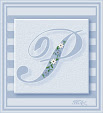
"Bless us Lord, this Christmas, with quietness of mind;
Teach us to be patient and always to be kind."
-- Helen Steiner Rice --
Kissing under the mistletoe is first found associated with )the Greek festival of Saturnalia) and later with primitive marriage rites. Mistletoe was believed to have the power of bestowing fertility, and the dung from which the mistletoe was thought to arise was also said to have "life-giving" power.
In Scandinavia, mistletoe was considered a plant of peace, under which enemies could declare a truce or warring spouses kiss and make-up.
In some parts of England the Christmas mistletoe is burned on the twelfth night lest all the boys and girls who have kissed under it never marry.
And for those who wish to observe the correct etiquette: a man should pluck a berry when he kisses a woman under the mistletoe, and when the last berry is gone, there should be no more kissing! by Sara Williams.
More Legend....
The mistletoe has long been considered a magical plant. It was believed to be conceived where lightning struck trees. It was worn as rings and around necks as protection from witchcraft, demons, fits, poison, and sickness. In spite of its toxicity, Germans called this plant Gut Hyl or "all-heal." It was used in various potions as a universal remedy and fertility drug. It gave strength to the athlete, the hunter, and the swordsman. Norsemen often gave the name "Mistelsteinn" to their swords because of the mistletoe's magical and strengthening effects.
This plant is Oklahoma's state flower.
Like other evergreens, the mistletoe is a symbol of immortality. Since it thrives in the trees rather than being rooted in the earth, it is considered representative of both the divine and the topsy turvy.
Like other parasitic plants, mistletoe symbolizes the feminine need for masculine protection and provision. Its white berries make this plant a lunar, female, or fertility symbol. Diana (a.k.a. Artemis), fertility goddess of the Ephesians wore a crown of mistletoe as an emblem of fertility and immortality. [Acts 19:24-41]
According to Crippen, any unmarried lady who is not kissed under the Christmas mistletoe will remain single for yet another year. A romantic symbol, this plant represents happiness, peace, and welcome. It is believed that ancient enemies, accidentally meeting under wild mistletoe in the forests, would embrace and enjoy a day of truce.
A lot of this kissing may have its origin in the Scandinavian myth of Balder, the Norse equivalent of Apollo the sun god. According to this myth, when Balder was born, his mother, Frigga, goddess of love and beauty, obsessed with concerns for her son's safety, created charms and drew promises from every creature, plant, and object that they would do no harm to him. Unfortunately, Frigga forgot to extract a promise from the mistletoe and the evil god, Loki, tricked his blind brother into throwing a mistletoe spear at Balder and inadvertently killing this god of sunlight and vegetation. The death of Balder brought winter into the world and caused Frigga to cry so pitifully that her tears turned into the plant's white berries. Fortunately, the gods restored Balder to life. Then Frigga declared that the mistletoe must ever after bring love rather that death into the world. Everyone passing under this plant was enjoined to embrace as Frigga planted a kiss of gratitude upon them in memory of the resurrection of her son.
Although its pagan associations often caused mistletoe to be banished from Christian festivities, it remained a popular Christmas symbol of love and eternal life. It was called Herbe de la Croix and Lignum Sanctae Crucis or "the Wood of the Sacred Cross" because it was believed to have been the tree which supplied the wood for the cross of Christ. For its part in the Crucifixion, it was condemned to the life of a parasitic vine, in the same way the serpent was condemned to crawl upon its belly for its part in the fall of man. Some believe that an additional penance was required: that the mistletoe bestow good fortune and blessings upon everyone who walked beneath it.
Because it grew on the sacred oaks they worshiped, Druids believed mistletoe was of divine origin; brought to earth by a stroke of lightning. It was believed to share in the strength of the oak. After the winter solstice, they gathered the plant with great ceremony in a sacred fertility ritual. It was cut with a golden sickle and caught in a white cloth to avoid its contamination by contact with iron or the earth. It was then offered to their gods along with a sacrificial bull.
With the coming of the new year, mistletoe becomes the legendary Golden Bough. Its withered yellow leaves were believed to assist its owner in the search for buried treasure. According to Virgil's story, Aeneas, leader of the Trojan refugees, carried the Golden Bough into the Underworld to seek news of his future from his deceased father. Other legends state that slaves might win their freedom by touching the sacred Golden Bough.
 Traditionally by the 6th of January, your Christmas decorations should be taken down.
The twelve days of Christmas are drawing to an end. Hopefully your Christmas and New Year celebrations were blessed and happy.
Traditionally by the 6th of January, your Christmas decorations should be taken down.
The twelve days of Christmas are drawing to an end. Hopefully your Christmas and New Year celebrations were blessed and happy. 














